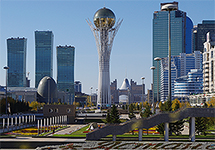
Astana, Kazakhstan, Source: Ken and Nyetta via WikiMedia Commons
Phillip C. Bleek
June 23, 2015
The following is an excerpt from the article in the National Interest.
With attention riveted on negotiations to constrain Iran’s nuclear activities, a recent development with significant implications for curbing global nuclear threats is receiving less attention than it deserves.
In mid-June, the International Atomic Energy Agency (IAEA) approved an agreement with Kazakhstan to allow it to host an Agency-controlled nuclear fuel bank as early as 2017.
Kazakhstan, which still grapples with its legacy of hosting the Soviet nuclear weapons test site and other weapons-related facilities, has embraced the role of a nonproliferation good citizen under the long-running leadership of President Nursultan Nazarbayev. Also playing key roles are investor Warren Buffett, who put up $50 million through the nonprofit Nuclear Threat Initiative, and the United States, EU, UAE, Kuwaiti, Norwegian, and Kazakh governments, who jointly contributed more than $100 million.
A fuel bank would provide countries barred from international markets with reliable access to fuel for their nuclear energy plants. This is particularly important given increased interest in nuclear energy as countries seek to diversify their energy portfolios and transition away from climate change-contributing carbon fuels. It would also be a major step toward realizing the vision, embodied in the 1970 Nuclear Non-Proliferation Treaty, of a world in which all states are able to take advantage of the peaceful benefits of nuclear technology without simultaneously risking the spread of nuclear weapons.
[…]The jury is out on whether an independent fuel bank will help with the Iran situation. Iran has over the past two decades done exactly what a fuel bank is intended to discourage: build up a robust domestic nuclear infrastructure, including uranium enrichment capabilities that could be used to make either nuclear reactor fuel or or fissile material for nuclear weapons. Iran has partly justified these efforts as a hedge against the possibility that other countries might deny it fuel, as some have in the past.
Read the full article at the National Interest.
